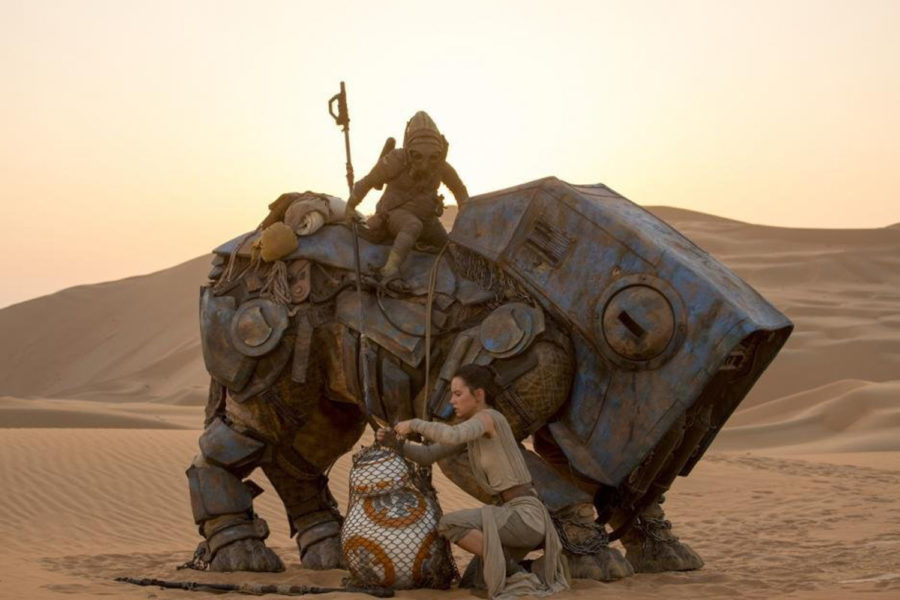‘Star Wars: The Force Awakens’ is destined to be big, but can rival films follow it into hyperspace?
December 8, 2015
It’s the cinematic equivalent of El Nino. Everyone knows it will be huge — the only question is how huge.
After months of buildup, “Star Wars: The Force Awakens” will finally hit theaters on Dec. 18, marking the climax of one of the most carefully orchestrated and closely watched rollouts of any film in history.
The movie is expected to shatter box-office records, given the torrid pace of advance ticket sales, which crashed the servers of Fandango and other purveyors in October. Guessing its ultimate opening-weekend tally has become a kind of Hollywood parlor game, with predictions for domestic returns ranging from $185 million to $250 million or more.
Advertisement
That “The Force Awakens” will reap massive returns for its studio, the Walt Disney Co., is undeniable. What is less clear is what sort of ripple effects the film will have on the wider Hollywood ecosystem around it.
Some believe the new “Star Wars” film will bring renewed force to a film industry that is waging a long-term campaign to hold on to an ever more fragmented and digitally distracted audience.
Others are concerned that “The Force Awakens” could hoover up so much of the holiday box office that it will leave other films opening in its vicinity — including the Tina Fey-Amy Poehler comedy “Sisters,” the hot-button NFL drama “Concussion” and Quentin Tarantino’s western “The Hateful Eight” — fighting for attention.
“What everyone is hoping is that ‘Star Wars’ will be the rising tide that raises all ships,” said Paul Dergarabedian, senior media analyst for the box office tracking firm Rentrak. “You don’t want it to be a giant sucking sound, where every other movie gets lost in this sea of ‘Star Wars.'”
The film business got off to a fast start this year with smashes such as “Furious 7,” “Avengers: Age of Ultron” and “Jurassic World” helping to tamp down talk that moviegoing, like traditional television watching or reading newspapers, was in the midst of a slow, irreversible decline.
But in recent months domestic returns have been more uneven — October and November ticket sales were both down from a year ago — and it remains to be seen whether Hollywood will hit the record-setting $11 billion mark some have predicted for the year.
The conventional wisdom has long been that a major hit movie for one studio is good for the entire industry. People who have a satisfying experience with “Star Wars” will want to go back to the theater again, the theory goes.
Advertisement*
Count Greg Foster, chief executive of Imax Entertainment and senior executive vice president of the Imax Corp., in this camp.
“I think it’s going to start to re-energize the momentum of moviegoing,” Foster said. “The last three or four months we hit a little bit of a rut. I think you’re going to find that ‘Star Wars’ has a halo effect … . We have 2 a.m. and 5 a.m. shows opening weekend that are sold out — I think that’s what makes this movie different from any other movie.”
Evidence of that halo effect, Foster noted, can already been seen in the intense behind-the-scenes jockeying among studios to have their trailers play in front of “The Force Awakens.”
“The sense is that any trailer that’s played with ‘Star Wars’ is not only going to have a wide audience but there’s going to be a very appealing experience with it,” Foster said. “You get a bump when you’re associated with a winner.”
Even as they assess the effect “The Force Awakens” could have on their slates over the coming weeks, rival studio executives are studying Disney’s marketing playbook for the film to figure out what strategies can be cribbed for future tentpole movies.
Since its inception in 1977, the “Star Wars” franchise has always been a kind of pop culture unicorn governed by its own rules.
Many have tried, with varying degrees of success, to copy the template set by series creator George Lucas, with its blend of spectacle, fast-paced action, intergalactic world-building and mythic archetypes. But even those who work within the “Star Wars” universe can’t fully comprehend the power the franchise continues to hold over audiences after nearly 40 years.
“It’s kind of mysterious,” said Lawrence Kasdan, who co-wrote “The Empire Strikes Back” and “Return of the Jedi” and was brought back to script “The Force Awakens” with director J.J. Abrams.
“There had been plenty of science fiction and spaceship movies before,” he said. “It uses very familiar story forms and elements that have been talked about endlessly. It has been ripped off 1,000 times since. I think it was George taking everything he loved in the movies — Akira Kurosawa right next to Flash Gordon and Howard Hawks — and when those things were mixed together in the way they were, it blew people’s minds.”
From the outset, Disney crafted its marketing campaign for “The Force Awakens” to tap into that core appeal of the franchise, stoking nostalgia for the original trilogy and conveying an air of momentousness around the new film.
The studio leveraged fan conventions such as Star Wars Celebration and Comic-Con and the power of social media — which surrounds us and penetrates us like the Force — to turn legions of “Star Wars” aficionados into ambassadors for the franchise.
“They have a way to directly talk to the consumer, to the fan,” Foster said. “It used to be that you had to do it through trailers in movie theaters and television commercials. Now they’re able to have direct conversations with them and ask them what they want, when they want it, where they want it.”
But while the “Force Awakens” marketing campaign has been a resounding success by any measure, whether it can be successfully replicated with other franchises is far from clear, according to Alex Robinson, a comic book writer and co-host of the podcast “Star Wars Minute.”
“It’s been masterful, but I don’t think you could just do it with anything,” Robinson said. “The fact is, people already love this property and are eager to be marketed to. I don’t know how you could make a bad ‘Star Wars’ trailer — just the music alone would be enough to get people into the theater. I don’t think you could do that with the Fantastic Four or a G.I. Joe movie or something like that.”
For that matter, Robinson added, it remains to be seen whether the frenzied anticipation around “The Force Awakens” will carry over to the future “Star Wars” sequels and spinoff films Disney and Lucasfilm have in the pipeline.
“We’re really in the heart of the storm right now,” he said, “but five years from now, when there’s been five more ‘Star Wars’ movies, will people be as excited? Who knows how long that enthusiasm will last?”
The fact is, for all the breathless hype surrounding “The Force Awakens,” there are some people who still aren’t entirely on the “Star Wars” bandwagon — even in Hollywood.
“I’m not a sci-fi guy,” actor Mark Wahlberg told The Times recently. “I’ve seen bits of ‘Star Wars.’ I was waiting for the (‘Force Awakens’) trailer to see if there was something new and exciting you haven’t seen before, like when you saw the dinosaurs in ‘Jurassic Park.’ And I don’t know. I see the excitement in my kids. I’ll check it out but … .”
(Wahlberg’s lack of enthusiasm could be influenced somewhat by the fact that his new film, the comedy “Daddy’s Home,” opens just one week after “The Force Awakens.”)
Ultimately, though “Star Wars” as a cultural touchstone may transcend the movies, “The Force Awakens” itself is a movie, and after all the pre-release hype is stripped away, audiences will receive it on those terms.
Older fans still remember the widespread feeling of letdown that accompanied the release of the three “Star Wars” prequels between 1999 and 2005. Those films earned roughly $2.5 billion collectively at the global box office and were the gateway into the “Star Wars” universe for a new generation, but they are not generally held in the same regard as the original trilogy.
“We’ve been through this before and we’ve had our heart broken once,” said Robinson. “We’re cautiously optimistic.”
Those fans for whom the “Star Wars” franchise can do no wrong may find that “lack of faith disturbing” (to quote Darth Vader). But until moviegoers finally get a chance to see “The Force Awakens,” it’s hard to know what its ultimate impact will be.
“‘Star Wars’ is ingrained in moviegoers’ DNA — it’s part of the culture,” Dergarabedian said. “But no matter how much ink is devoted to this movie, it still has to deliver a certain level of entertainment and a certain type of experience. At the end of the day, that really trumps everything.”
(c)2015 Los Angeles Times
Visit the Los Angeles Times at www.latimes.com
Distributed by Tribune Content Agency, LLC.
Advertisement









